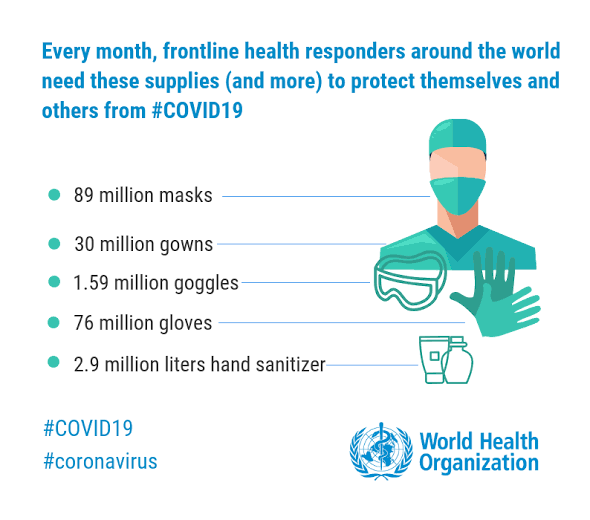The World Health Organisation (WHO) says the chronic global shortage of personal protective equipment is now one of the most urgent threats to collective ability to save lives.
SEE ALSO: Dutch Court adjourns Trial into Flight MH17 Downing until June
Dr Tedros Ghebreyesus, Director-General of WHO said this in a speech read at a news conference in Geneva on Friday, posted on the agency’s website.
“WHO has shipped almost two million individual items of protective gear to 74 countries that need it most, and we are preparing to send a similar amount to a further 60 countries. But much more is needed.
“This problem can only be solved with international cooperation and international solidarity; when health workers are at risk, we are all at risk.
“Health workers in low- and middle-income countries deserve the same protection as those in the wealthiest countries.
“To support our call on all countries to conduct aggressive case-finding and testing, we’re also working urgently to massively increase the production and capacity for testing around the world,’’ Ghebreyesus said.
According to him, one of the most important areas of international cooperation is research and development.
“A vaccine is still at least 12 to 18 months away.
“In the meantime, we recognise that there is an urgent need for therapeutics to treat patients and save lives.’’
The director-general announced Norway and Spain first patients would shortly be enrolled in the Solidarity Trial, which would compare the safety and effectiveness of four different drugs or drug combinations against COVID-19.
“This is a historic trial which will dramatically cut the time needed to generate robust evidence about what drugs work.
“More than 45 countries are contributing to the trial, and more have expressed interest. The more countries who join the trial, the faster we will have results.
“In the meantime, we call on individuals and countries to refrain from using therapeutics that have not been demonstrated to be effective in the treatment of COVID-19.
“The history of medicine is strewn with examples of drugs that worked on paper, or in a test tube, but didn’t work in humans or were actually harmful,’’ he said.
During the most recent Ebola epidemic, for example, he said some medicines that were thought to be effective were found not to be as effective as other medicines when they were compared during a clinical trial.
Ghebreyesus said WHO had published more than 40 guidance documents on its website, providing detailed, evidence-based recommendations for governments, hospitals, health workers, members of the public and more.
He said more than one million health workers had been trained through our courses on OpenWHO.org. We will continue to train more.
“We are also delighted to report that the COVID-19 Solidarity Fund has now received donations of more than US$ 108 million in just two weeks, from 203,000 individuals and organisations.’’
According to him, there are now more than half a million confirmed cases of COVID-19 and more than 20,000 deaths.
“These are tragic numbers, but let is also remember that around the world, more than 100,000 people have recovered.
“Yesterday, I had the honour of addressing an extraordinary meeting of leaders from the G20 countries.
“My message was threefold: we must fight, unite and ignite. Fight to stop the virus with every resource at our disposal;
“Unite to confront the pandemic together. We are one humanity, with one, common enemy. No country can fight alone; we can only fight together.
“And ignite the industrial might and innovation of the G20 to produce and distribute the tools needed to save lives.’’
In addition, Ghebreyesus said stakeholders must also make a promise to future generations, saying never again.
“Viral outbreaks are a fact of life. How much damage they do is something we can influence.
“I thank the G20 countries for their commitment to fight the pandemic, safeguard the global economy, address international trade disruptions and enhance global cooperation.
“This is especially important for countries who are not part of the G20 but will be affected by decisions made by G20 countries,’’ he said.

